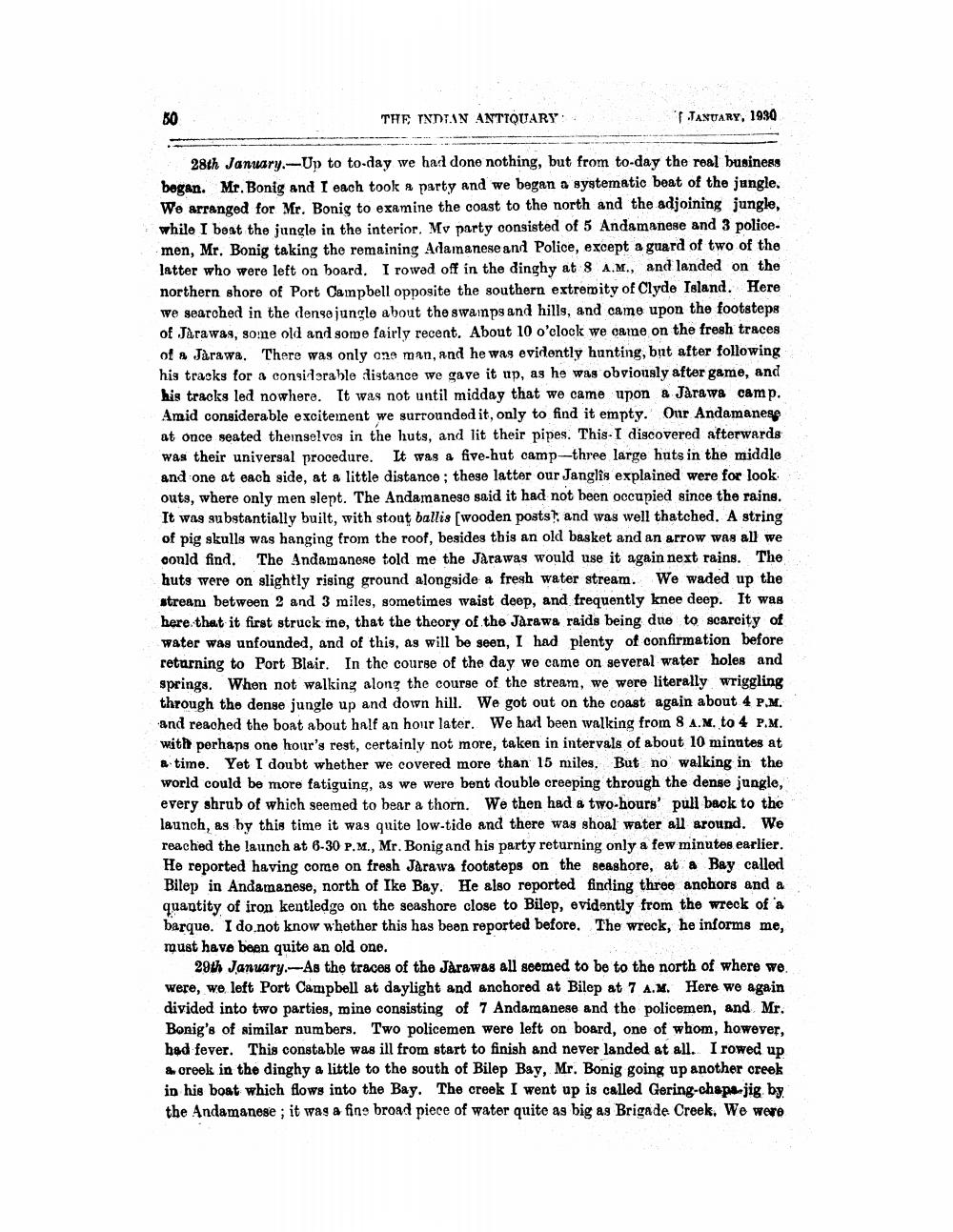________________
80
THE INDIAN ANTIQUARY
JANUARY, 1930
28th January.--Up to to-day we had done nothing, but from to-day the real business began. Mr. Bonig and I each took a party and we began a systematic beat of the jungle. We arranged for Mr. Bonig to examine the coast to the north and the adjoining jungle, while I boat the jungle in the interior. Mv party consisted of 5 Andamanese and 3 police. men, Mr. Bonig taking the remaining Adaianese and Police, except a guard of two of the latter who were left on board. I rowed off in the dinghy at 8 AM, and landed on the northern shore of Port Campbell opposite the southern extremity of Clyde Island. Here we searched in the dense jungle about the gwainps and hills, and came upon the footsteps of Jårawas, so:ne old and some fairly recent. About 10 o'clock we came on the fresh traces of a Járawa. There was only one man, and he was evidently hunting, but after following his tracks for a considerable distance we gave it up, as he was obviously after game, and his tracks led nowhere. It was not until midday that we came upon & Jàrawa camp. Amid considerable excitement we surrounded it, only to find it empty. Our Andamanese at once seated theinselves in the huts, and lit their pipes. This. I discovered afterwards was their universal procedure. It was a five-hut camp-three large huts in the middle and one at each side, at a little distance; these latter our Janglis explained were for look outs, where only men glent. The Andamanese said it had not been occupied since the rains. It was substantially built, with stout ballis (wooden posts, and was well thatched. A string of pig skulle was hanging from the roof, besides this an old basket and an arrow was all we oonld find. The Andamanose told me the Jarawas would use it again next rains. The huts were on slightly rising ground alongside a fresh water stream. We waded up the strean between 2 and 3 miles, sometimes waist deep, and frequently knee deep. It was here that it first struck ine, that the theory of the Jarawa raids being due to scarcity of water was unfounded, and of this, as will be seen, I had plenty of confirmation before returning to Port Blair. In the course of the day we came on several water holes and springs. When not walking along the course of the stream, we were literally wriggling through the denge jungle up and down hill. We got out on the coast again about 4 P.M. and reached the boat about half an hour later. We had been walking from 8 A.M. to 4 P.M. with perhaps one hour's rest, certainly not more, taken in intervals of about 10 minutes at a time. Yet I doubt whether we covered more than 15 miles. But no walking in the world could be more fatiguing, as we were bent double creeping through the dense jungle, every shrub of which seemed to bear a thorn. We then had a two-hours' pull back to the launch, as by this time it was quite low-tide and there was shoal water all around. We reached the launch at 6-30 P.M., Mr. Bonig and his party returning only a few minutes earlier. He reported having corce on fresh Jårawa footsteps on the seashore, at a Bay called Bilep in Andamanese, north of Ike Bay. He also reported finding three anchors and a quantity of iron kentledge on the seashore close to Bilep, evidently from the wreck of a barque. I do not know whether this has been reported before. The wreck, he informs me, must have been quite an old one.
29th January.--As the traces of the Jarawas all seemed to be to the north of where we were, we left Port Campbell at daylight and anchored at Bilep at 7 A.M. Here we again divided into two parties, mine consisting of 7 Andamanese and the policemen, and Mr. Bonig's of similar numbers. Two policemen were left on board, one of whom, however, had fever. This constable was ill from start to finish and never landed at all. I rowed up doreek in the dinghy a little to the south of Bilep Bay, Mr. Bonig going up another creek in his boat which flows into the Bay. The creek I went up is called Gering-chaparjig by. the Andamanose; it was a fino broad piece of water quite as big as Brigade Creek. We were




